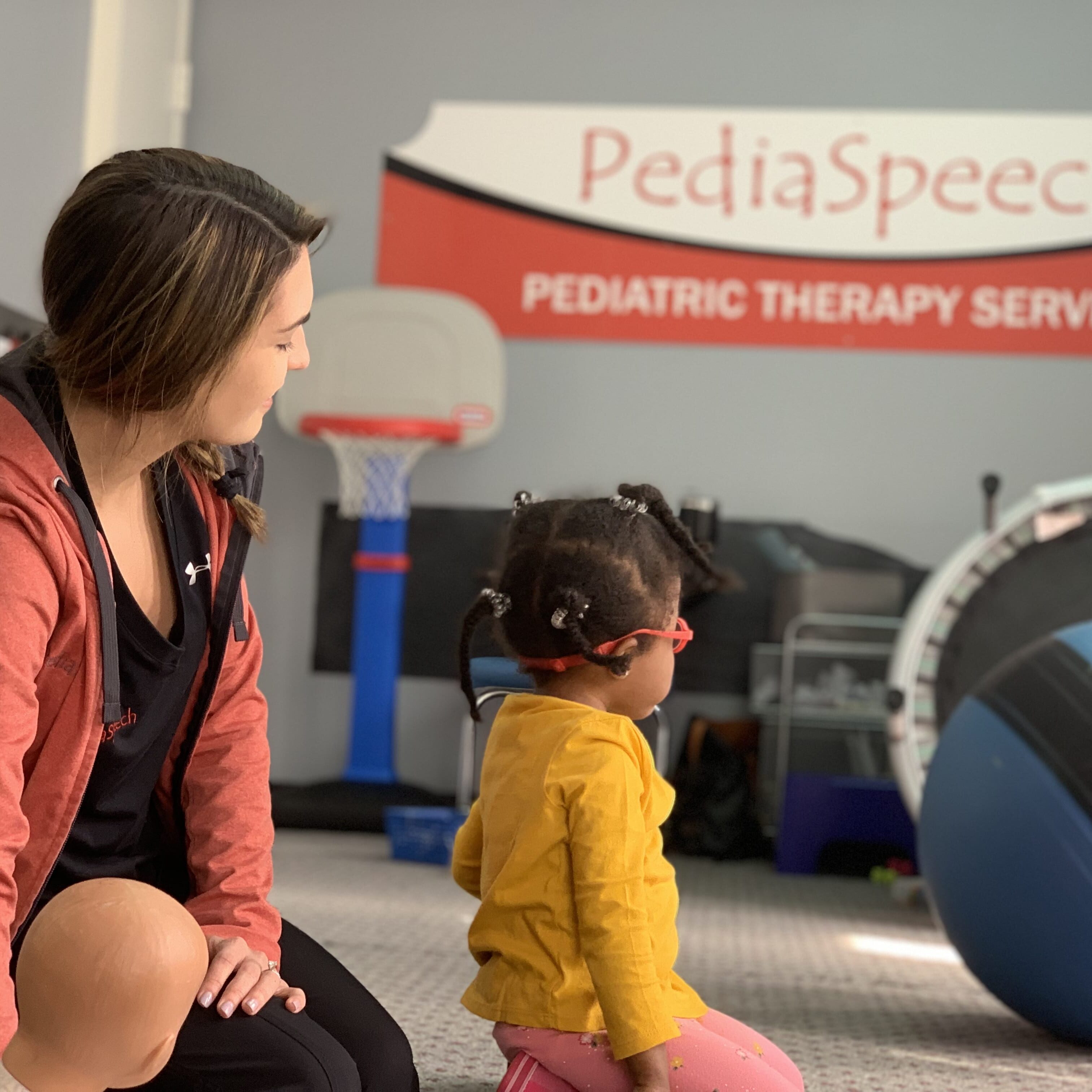Occupational Therapy for kids in Atlanta, GA
Children learn about their world through movement and play. At PediaSpeech we help children build skills to navigate through their environment more freely. We offer both in-person and telehealth Occupational Therapy (OT), depending on your child's needs.
What is Occupational Therapy?
Through occupational therapy, we provide the opportunity to develop the strength, body awareness, balance, and perceptual abilities necessary to acquire gross and fine motor skills in order to make interacting with the environment a successful experience for your child.
A variety of sensory and movement experiences are provided at our Atlanta location to introduce the child to activities and interactions aimed at developing specific areas based on the child's needs. The approach taken at PediaSpeech is family oriented and parents are exposed to methods that can be taken home and incorporated into the daily routine with the goal of generalizing the child's learned skills across contexts.

Does your child need occupational therapy?
A referral for an occupational therapy evaluation may be necessary if your child has difficulties in several of the areas listed below or major functional problems in one area.
- Unusually fussy, easily startled, or difficult to console as an infant
- Slow to achieve motor milestones, such as rolling over, creeping, sitting, standing, or walking
- Strongly dislikes and protests baths, hair washing, haircutting, or nail cutting
- Uses inappropriate amounts of force when handling objects, coloring, writing, or interacting with friends, sibling, or animals
- Leans on people, slumps when sitting, tires/fatigues easily, has poor muscle tone
- Proprioception, falls frequently, bumps into furniture or people, is clumsy, or has difficulty judging position of his/her body in relation to space
Hear From Other Parents...
My daughter currently sees Maria and Melissa for OT. They have been fantastic. They are caring, but always try to find new ways to challenge and interest her. My daughter is on the spectrum, but she always lights up when she sees them. We are very happy there.
We’ve been coming to Pediaspeech for almost a year now and the improvement in our two year old has been exponential. Working with both Ms. Melissa and Ms. Maria has taken us from not walking to running, EVERYWHERE! The range of things they work on with her is incredible and our daughter absolutely loves them. For speech we’ve seen Ms. Kayla and Ms. Lauren and they’ve both worked super hard to get our daughter talking. We absolutely love everyone there and would recommend Pediaspeech to anyone and everyone.
My son has CP and when his previous OT decide to close we were guided to PedisSpeech. He absolutely loves Melissa and Maria they are patient but still push him to get stronger. They have been a great asset to our team of care providers. Thanks ladies for all of your continued support!!!
 Physical Disabilities
Physical Disabilities
Physical disabilities include a wide range of disabilities and health issues. They can be either congenital or acquired. Physical disabilities interfere with a child's ability to attain the same developmental milestones as other children his or her age.
If appropriate, our Occupational Therapist can assist in addressing many of these issues and teach strategies that will help children with physical disabilities accomplish their goals and dreams.
 Fine Motor Difficulties
Fine Motor Difficulties
Fine motor control is often thought of due to its essential role in participating in school-based activities such as writing, cutting, coloring, and manipulating any small objects. Fine motor area of development is also needed for independence in dressing, feeding, hygiene, play, and almost any facet of life one is engaged. Children require the development of fine motor skills to grasp and voluntarily release any object and complete tasks efficiently and effectively. Occupational therapy can affect change in this developmental area through strengthening, bilateral tasks, adaptive strategies, and parent education to help the child build confidence in what can be a very frustrating area of development.
 Sensory Processing Disorders (SPD)
Sensory Processing Disorders (SPD)
Sensory Processing (sometimes called "Sensory Integration") refers to the way the nervous system receives messages from the senses and turns them into appropriate motor and behavioral responses.
A child with SPD finds it difficult to process and act upon information received through the senses. Often times the sensory stimuli received is perceived as too high intensity (hypersensitivity / hyper-responsive) or not perceived at all (hyposensitivity / hypo-responsive). Sensory integration issues can create everyday problems such as: poor motor planning, decreased body awareness, behavioral problems, anxiety, low self-esteem, poor understanding of one’s environment, and distress caused by being generally overwhelmed.



You must be logged in to post a comment.